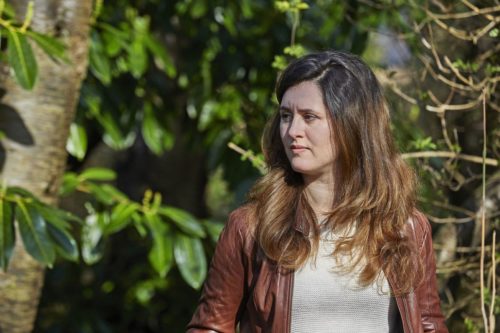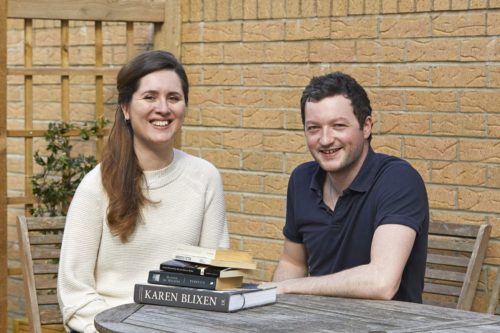Barbara’s experience of migraine with aura
The aura symptoms make me extremely vulnerable and can be temporarily disabling
My first migraine attack
I was eight years old when I experienced my first migraine attack with aura. It is safe to say that it was one of the scariest things that had ever happened to me. I was playing with my brother, and all of a sudden I realised I could not see from my right eye.
When panicking I ran to my mum, I could not find the words to let her know what was happening to me. Visual disturbances and aphasia are really common aura symptoms for people with migraine, but for an eight year old, they can feel like the end of the world.
Since then, migraine has been a constant part of my life. The intensity of my migraine has fluctuated over the years. When I was younger I could go for months without an attack, but the frequency of my attacks has increased to once or twice per week.
My aura symptoms
To me, the worst aspect of migraine is the unpredictability of migraine attacks – one moment I can be cycling through a field, the next, I can’t see.
The aura symptoms of a migraine attack make me extremely vulnerable and can be temporarily disabling. Over the course of three or four hours (depending on the intensity of my attack) I experience a variety of neurological symptoms which include: visual disturbances, inability to speak, and loss of sensitivity on parts of your body such as your face, your arms and your hands.
After this, the pain starts, and no – it is not just a headache. It feels like somebody is drilling the inside of my brain. I can’t look at the light, hear noises, or even move my head. Sometimes the pain is so bad that I get sick. Sometimes I am fine after a few hours, sometimes it can take a few days to recover. In my experience, recovery takes two days.
It is very isolating
Migraine attacks are not only extremely debilitating – during an attack I am unable to drive, read, eat, work, or let alone function like a normal human being – they can also make me feel extremely isolated. The pain becomes a dark place where I become unreachable.

Nothing really helps. I have tried different types of medication. There is no magic pill for migraine, and to this day, there is no cure.
The effect of migraine, especially when chronic, is huge on my life. It affects my relationships, my career, my social life, and my mental health. Unwillingly, I become unreliable. I say yes to invitations, and an hour before I might have to call it off. And even if I explain my condition over and over again, there will always be someone telling me to “pull yourself together, it is just a headache”.
Or someone who wants to help and suggests that ibuprofen/ice packs/ heath packs/ essential oils work great for their headaches. Trust me, I have tried every possible treatment under the sun, including a woman swinging a quartz crystal around me, and another one ‘healing’ me with the power of their hands.
Managing my migraine
Nothing works, and is not always easy to identify my triggers, which include: stress, a strong smell, lack of sleep, too much sleep, too much caffeine, not enough caffeine, too strenuous exercise, not enough exercise, and so on.
For years I hoped I would eventually identify THE trigger, be able to isolate it and never have a migraine again. Maybe if I stopped eating chocolate/gluten/dairy/sugar/caffeine? While it certainly helps to have a healthy and balanced diet, excluding entire food groups from my diet has most definitely not made a difference on my migraine. And frankly, life is too short to give up on chocolate.
Living with migraine is an endless battle between trying to be normal, and struggling with the constant, underlying anxiety of when the next attack is going to hit me. Will I be ok to present a paper at that conference? Will I be ok going on that camping trip? Will I be ok on my wedding day?
Family support
I am very lucky to have an extremely supportive family around me. My dad lives with migraine too, although not as frequent as mine, so he knows exactly what I am going through. In my darkest and most painful periods of migraine, my parents and my husband are always there to remind me to live my life and not let my migraine define me. I have spent many years of my life being angry at my migraine, and being scared of their unpredictability, but at the end of the day, it’s not worth it.

Instead, I did learn to know my migraine, and accept them as part of who I am. They are not the lightest part of me, but they are there “and what would the earth look like if shadows disappeared from it?”, as Mikhail Bulgakov rightly wrote in The Master and Margarita.
Sometimes my migraine have been a way for my body to tell me to slow down and to take better care of myself, or even to make me understand that I was in a situation that needed change. I know migraine is hard, and that finding help can be frustrating (not all GP’s are always particularly supportive), but I always console myself by thinking that they are also the sign of a very sensitive brain, and generally seems to affect highly intelligent people (hello, Einstein!).
So there, every cloud has a silver lining. I hope telling my story will help people with migraine to feel less alone, and people with no migraine to understand this condition better.


